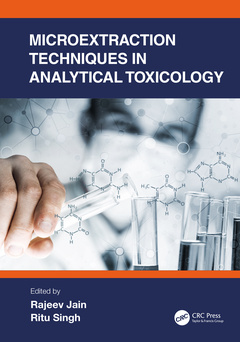Description
Microextraction Techniques in Analytical Toxicology
Coordinators: Jain Rajeev, Singh Ritu
Language: English
Subjects for Microextraction Techniques in Analytical Toxicology:
Keywords
Sorbent; Toxicology; Deep Eutectic Solvent; Electromembrane Extraction; Microextraction; Sample Preparation; LPME; MLLE; Liquid Liquid Microextraction; Magnetic SPE; SDME; DLLME Method; Liquid Phase Microextraction Methods; Microextraction Techniques; DLLME; SBSE; Pre-concentration Factors; Analytical Toxicology; SPME; Hollow Fibre LPME; DLLME Process; DLLME Technique; SPME Fibre; Headspace SDME; Packed Sorbent; Ethylene Glycol Dimethacrylate; Acceptor Phase; Dispersive Liquid Liquid Micro-extraction; Magnetic MIPs
· 17.8x25.4 cm · Hardback
Description
/li>Contents
/li>Readership
/li>Biography
/li>
Microextraction Techniques in Analytical Toxicology provides the information readers need to include about cutting-edge sample preparation techniques into their everyday analytical practice, including comprehensive information about principles and state-of-the-art microextraction sample preparation techniques for the analysis of drugs and poisons in biological specimens, especially in forensic and clinical settings.
This book also focuses on theoretical discussions of solid-based and liquid-based microextraction techniques, their method development, validation, and applications. A detailed compilation of analytical protocols based on published microextraction procedures to aid in method development, synthesis, and the application of green solvents (ionic liquids and deep eutectic solvents) and new sorbents, such as molecularly imprinted polymers, and their application in microextraction techniques are also covered.
Features:
- Provides a systematic review of microextraction techniques applied in analytical toxicology
- A comprehensive guide for the practical implementation of microextraction techniques in forensic, clinical, and analytical laboratories
- Contains figures and tables for easy understanding and quick adaptation of the parameters of microextraction techniques
- Fundamentals, development, and applications of microextraction techniques as a sample preparation procedure are discussed in detail
- Extremely useful for the researchers and academicians engaged in analytical method development using microextraction techniques
This book appeals to a wide readership of forensic, clinical, and analytical toxicologists, as well as academicians and researchers. Written by eminent scientists and leading experts on sample preparation techniques, this book serves as a desk reference for routine laboratory analysis and as an indispensable teaching tool in the classroom for graduate and Ph.D. students.
Dr. Rajeev Jain is Senior Scientist of Forensic Toxicology at Central Forensic Science Laboratory, Ministry of Home Affairs, Govt. of India. He has more than 10 years of research experience in the field of analytical toxicology. During his tenure as Forensic Toxicologists, he has examined post-mortem samples of more than 500 medico-legal cases pertaining to drug overdose and poisoning. He has obtained his Ph.D. degree in Analytical Toxicology from CSIR-Indian Institute of Toxicology Research (India). His research work is focused on Development of simple, rapid, eco-friendly, cost-effective, sensitive and selective analytical methods based on microextraction techniques (such as SPME and DLLME etc.) for the determination of chemical analytes for forensic toxicological, clinical and environmental importance in various complex samples such as blood, saliva, plasma, urine, tissue etc. using GC-MS, GC-FID, HPLC, GC-ECD and TLC-image processing technique. He has published many research papers, review papers and book chapters in various referred journals on this subject. He was one of the first scientists to explore the possibility of coupling dispersive liquid-liquid microextraction with injector port silylation for rapid analysis of polar toxicants. He is also acting as invited reviewer in various referred journals and on the editorial board of various open access journals of Toxicology and Chromatography.
Dr. Ritu Singh is an Assistant Professor in Department of Environmental Science, School of Earth Sciences, Central University of Rajasthan, Rajasthan, India. Her research interest includes analytical method development, microextraction techniques, nano-remediation, environmental monitoring and assessment. She received her doctorate degree in Environmental Science from Babasaheb Bhimrao Ambedkar University, Lucknow. She worked as research fellow in CSIR-Indian Institute of Toxicology Research for five years and made significant contribution in
These books may interest you

Solid-Phase Extraction 189.08 €



